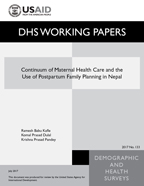- PUBLICATIONS
- JOURNAL ARTICLES
- ACCESS PUBLICATIONS
Publications Summary
- Document Type
- Working Papers
- Publication Topic(s)
- Family Planning, Maternal Health
- Country(s)
- Nepal
- Language
- English
- Recommended Citation
- Kafle, Ramesh B., Komal P. Dulal, and Krishna P. Pandey. 2017. Continuum of Maternal Health Care and the Use of Postpartum Family Planning in Nepal. DHS Working Paper No. 133. Rockville, Maryland, USA: ICF.
- Download Citation
- RIS format / Text format / Endnote format
- Publication Date
- July 2017
- Publication ID
- WP133
Download
 Continuum of Maternal Health Care and the Use of Postpartum Family Planning in Nepal (PDF, 453K)
Continuum of Maternal Health Care and the Use of Postpartum Family Planning in Nepal (PDF, 453K)
